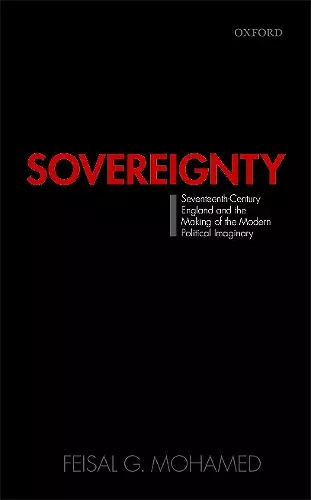Sovereignty: Seventeenth-Century England and the Making of the Modern Political Imaginary
Format:Hardback
Publisher:Oxford University Press
Published:14th Feb '20
Should be back in stock very soon

This book argues that sovereignty is the first-order question of political order, and that seventeenth-century England provides an important case study in the roots of its modern iterations. It offers fresh readings of Thomas Hobbes, John Milton, and Andrew Marvell, as well as lesser-known figures and literary texts. In addition to political philosophy and literary studies, it also takes account of the period's legal history, exploring the exercise of the crown's feudal rights in the Court of Wards and Liveries, debates over habeas rights, and contests of various courts over jurisdiction. Theorizing sovereignty in a way that points forward to later modernity, the book also offers a sustained critique of the writings of Carl Schmitt, the twentieth century's most influential, if also most controversial, thinker on this topic.
I enjoyed Sovereignty a great deal: it is thoughtful, argumentative, and bristling with insights and ideas. Feisal Mohamed is a serious critic who can travel over familiar ground and discover new things * Andrew Hadfield, The Seventeenth Century *
wide-ranging book * Alex Garganigo, Austin College, Seventeenth-Century News *
Feisal Mohamed's Sovereignty is a significant contribution to our understanding of how the crises of seventeenth-century England contributed totwentieth-century political thought. Each chapter of Mohamed's bookoffers a wide-ranging inquiry into the political concerns and literary endeavors of key figures in Commonwealth and Restoration culture and concludes with an effort to bring these seventeenth-century developments intodialogue with the controversial German legal theorist Carl Schmitt (1888–1985), whose concept of sovereignty, and its parallel critique of liberal democracy, was informed by a fascination with early modern England. Mohamed'sbook invites searching questions about the roots of liberalism in the AngloAmerican tradition and that liberal tradition's complicity with its apparentopposite, an often authoritarian conception of unitary sovereignty. * Jennifer R. Rust, Saint Louis University, Modern Philology *
acerbic, pithy and scrupulously intelligent ... [the book] is thoughtful, argumentative, and bristling with insights and ideas * Andrew Hadfield, University of Sussex, The Seventeenth Century *
Professor Mohamed is a distinguished student of English Renaissance literature who also has formidable expertise in political philosophy and legal history. This knowledge has been admirably distilled in this study, and ably accommodated to the understanding of students and scholars of the period. I particularly enjoyed the reading of John Barclay and the romances of the 1650s, the fresh understanding of Milton's Paradise Regained, and the shrewd account of Marvell's reworking of Cavalier poetry -- and the epilogue on Uzzah is a triumph. I learned an immense amount from the book, and heartily recommend it. * Gordon Campbell, Fellow in Renaissance Studies, University of Leicester *
Feisal Mohamed's Sovereignty is an impressively original, interdisciplinary contribution to the study of seventeenth century political thought and to contemporary democratic theory. Employing tools from literary theory and intellectual history, Mohamed sheds new light on debates over sovereignty in seventeenth century England and their legacies in twentieth century state theory. A powerful re-reading of sovereignty from Hobbes to Schmitt. * John P. McCormick, Professor, Political Science Department, University of Chicago *
This stimulating, ambitious interdisciplinary study, as its subtitle indicates, links seventeenth century and modern concerns...Feisal Mohamed's consistently intelligent and stimulating study of what he calls "the political imaginary" asks the right questions. * Warren Chernaik, University of London, UK, The European Legacy *
ISBN: 9780198852131
Dimensions: 223mm x 142mm x 19mm
Weight: 406g
232 pages